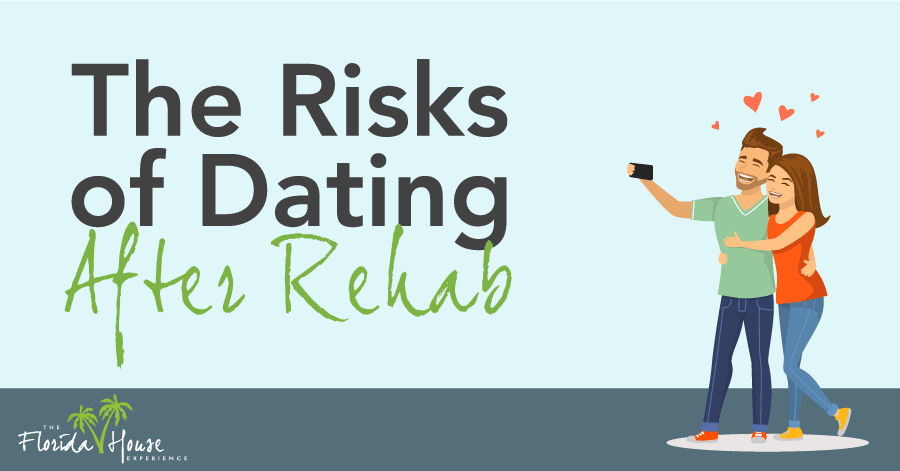
Rehabilitation has the ability to change many things about the ways in which you go about your life, from daily routines to recreational activities. In just a matter of weeks or months, everything about the way you live turns upside down.
The process of rehab is designed to provide a clearer focus, healthier habits and an adjustment to a lifestyle that emphasizes sobriety. During the course of actual treatment — like detox, inpatient rehabilitation, partial hospitalization programs, and intensive outpatient care — attention is primarily focused on navigating recovery safely and happily. But what about after successful program completion, when the daily pressures of work, bills and, more importantly, relationships return?
Dating After Rehab
You’re out of treatment, you’ve succeeded in sobriety without relapse and you’re feeling good about how far you’ve come. Is it time to start dating?
Well, maybe — but also maybe not. Believe it or not, many people assume that rehab is the perfect place to meet a soul mate, but this rarely works out. While bonding with a fellow substance user can seem convenient, it adds further complications that can put sobriety in jeopardy.
At a time when your focus should be on your own personal journey, it’s not always easy or possible to take attention from your goals to give to someone else. In fact, doing so can detract from your progress in recovery, particularly when your partner is on a separate journey of their own.
Before leaping into the dating pool, be sure you’re truly ready to commit to another person while maintaining your commitment to yourself. These dos and don’ts can help you make the right choices as you work to rebuild a normal, healthy life.
Do Take Your Time
Dating is never a sprint versus a marathon, and this is particularly true post-rehabilitation. Entering into a relationship isn’t going to make anything about recovery easier; instead, it can deeply complicate the emotional and psychological effort required to maintain sobriety, especially in those early days.
Even if you think you’ve met the right person and are sure it’s the right time, think carefully before moving forward, and if you choose to do so, move very slowly. Entering into a relationship too soon can significantly jeopardize your recovery — some experts suggest holding off for at least a year — to be absolutely sure before making any kind of choice. When in doubt, the answer is no.
 Do Avoid Substance Users
Do Avoid Substance Users
Dating another person with a history of substance abuse seems like a perfect fit — after all, these people know what you’re going through and have been in your shoes. However, this can be a mistake.
When in recovery, it’s important to put yourself first. Dating someone with an increased potential for relapse can put your own sobriety in jeopardy, particularly when your journey is in its early stages. After a few years of success and confidence in your recovery, it may be okay to date another recovering addict in the same place, but dating someone in the initial stages of treatment can be a recipe for disaster. Another recovering user is unlikely to be grounded enough to provide proper support and may be doing the same thing you are — replacing a dependence on drugs with a dependence on a relationship.
 Do Watch for Signs of Relapse
Do Watch for Signs of Relapse
Even the most dedicated individuals with substance use disorders are at a persistent risk of relapse — around 40 percent to 60 percent. When in a relationship with another person newly out of rehabilitation, the likelihood can increase dramatically.
Being around another addict who slips up can be the start of a vicious cycle in which both parties end up back in a habit of abusive behavior. If you do choose to date someone else early in recovery, keep a close eye on signs of relapse, including lying or omitting information about whereabouts, missing the money, avoiding previous hobbies and spending more time alone.
Do Monitor Mental Health
Mental health and wellness are major parts of a successful recovery. While healthy relationships are often benign, unhealthy relationships can be a detriment to mental health, which can be a trigger for relapse.
If at any point in a relationship you feel jealous, angry, nervous, anxious or worried about either the stability of your partnership or your safety when with your partner, it may be appropriate to terminate your relationship. Listen to your intuition, and place your health, both mental and physical, above any relationship. If this becomes a repeating pattern, it may be prudent to wait for a longer period of time before considering forging romantic connections.
Don’t Date in Treatment
When actively in treatment, it is critically important that you do not enter into any relationships with anyone in your program or adjacent treatment programs. This is among the most important considerations in dating after seeking rehabilitation; in detox, inpatient, partial hospitalization and outpatient programs, you must make yourself your top priority.
To discourage dating, most reputable rehabilitation centers operate single gender programming. Regardless of the makeup of your program, limit interactions with anyone who may compromise goals or ethics and remain focused on sobriety above all else.
 Don’t Date Sponsors
Don’t Date Sponsors
Many treatment programs, like Alcoholics Anonymous, make use of a sponsorship system to guide those new to recovery. These sponsors are intended to offer mentorship and support in the earliest days of rehabilitation, smoothing the path toward successful sobriety.
The relationship between a sponsor and sponsee is very special and generally results in a close bond — a bond that should never become romantic. A sponsorship-turned-romance can be deeply damaging to mental health, creating a situation in which priority will be skewed away from recovery and toward self-serving interests.
 Don’t Be Afraid to Leave
Don’t Be Afraid to Leave
Not all relationships are going to succeed. Around 60 percent of relationships end in the first year, indicating that relationships are a process of trial and error and there are often more mistakes than triumphs. As such, when in recovery, it’s important to realize that your first, second or third attempts at love may not work out, and that’s okay.
No relationship is worth your wellness, and being alone is better than being trapped in a cycle of abuse, neglect or simply incompatibility. If something doesn’t seem just right, it’s okay to do what’s best for your body and say goodbye. There will be plenty of healthier chances in the future.
Encouraging Health in Treatment
At FHE Health, mental, physical and emotional health are our top priorities. To accomplish this, we employ an environment that supports independent discovery, psychological support and, most importantly, gender-separate programming. In doing so, we are able to discourage dating and romantic relationships while focusing on individual success and healthy bonds among those who move through our stages of care.
After recovery, dating will certainly become a part of daily life once more, but dating while sober comes with its own set of limitations. By moving slowly, prioritizing oneself and keeping mental health in mind, it is possible to enjoy a relationship without compromising successful sobriety.
If you’re interested in recovery and what that could mean for your life, call FHE Health at (833) 596-3502
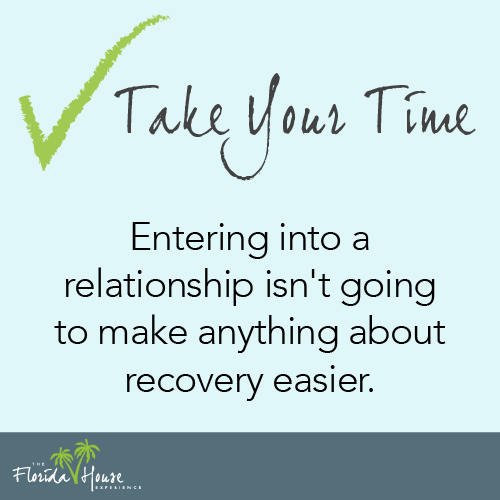
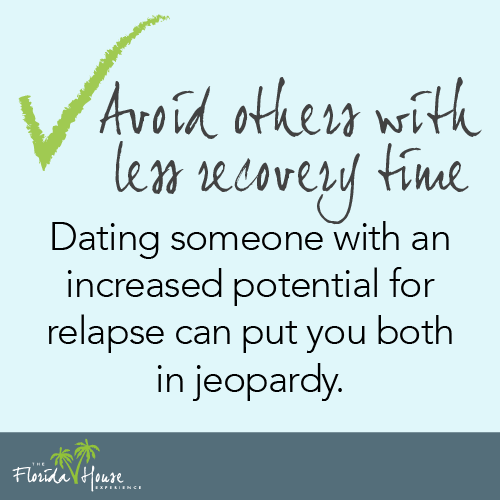 Do Avoid Substance Users
Do Avoid Substance Users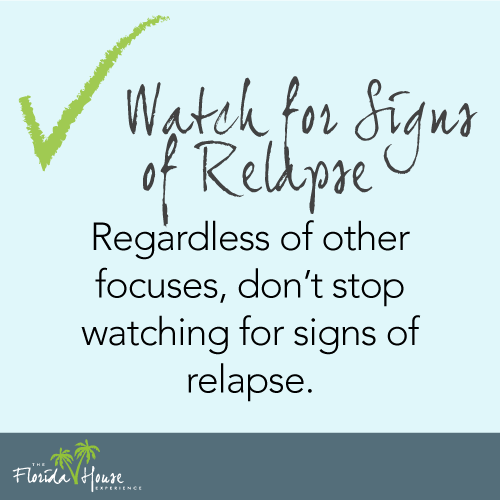 Do Watch for Signs of Relapse
Do Watch for Signs of Relapse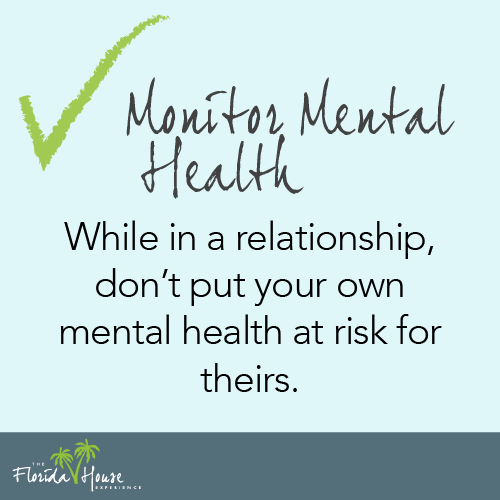
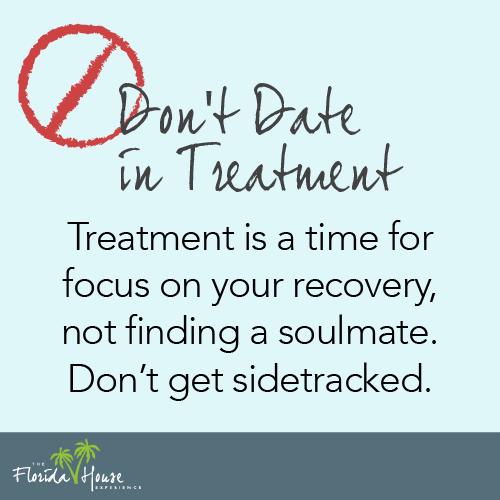
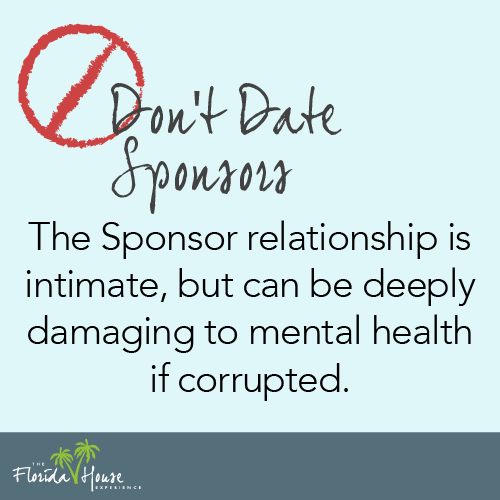 Don’t Date Sponsors
Don’t Date Sponsors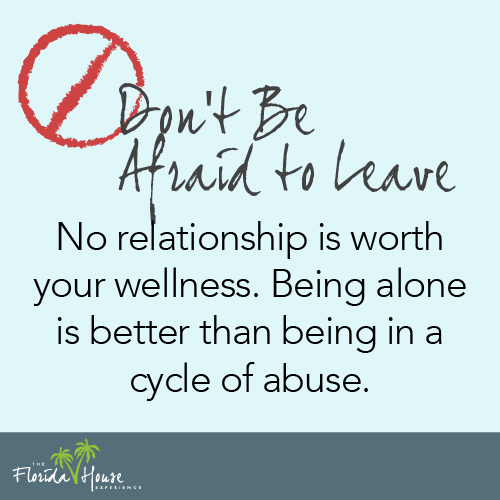 Don’t Be Afraid to Leave
Don’t Be Afraid to Leave





